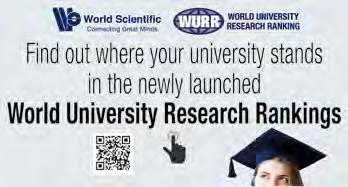
3 minute read
GENETICS AND GENOMICS
MEMORY MAKES THE BRAIN
The Biological Machinery that Uses Experiences to Shape Individual Brains
by Christian Hansel (The University of Chicago, USA)
The development of the young brain after birth and the emergence of cognitive capacities, mind, and individuality rest on the maturation of a dense net of synaptic connections between neurons. Memory Makes the Brain describes the dramatic, competitive elimination of surplus synapses that occur in the young, maturing brain — in a process called synaptic pruning that was discovered by pediatric neurologist Peter Huttenlocher in the 1970’s at the University of Chicago. Explaining similarities between developmental pruning and learning processes in the adult brain, neurobiologist Christian Hansel offers a unique perspective on brain adaptation and plasticity throughout lifetime, at times weaving in personal accounts and memories.
192pp Jan 2021 978-981-122-880-3 US$78 £70
STRATEGIC LEARNING
A Holistic Approach to Studying
by Robert K Kamei (National University of Singapore, Singapore & Duke University, USA)
“Learning scientists have done a good job of getting their findings to instructors to help them improve their teaching. But so much of learning is under the student’s — and only the student’s — control. Strategic Learning fills a critical need to educate students on what the field knows about how to learn productively. We should be getting it into the hands of every university student.” Lori Breslow
Senior Lecturer, MIT Sloan School of Management Founding Director, MIT Teaching & Learning Laboratory
200pp Jul 2021 978-981-122-663-2 US$58 £50 978-981-122-777-6(pbk) US$28 £25
STEM CELLS
From Hype to Hope
edited by Khawaja Husnain Haider (Sulaiman AlRajhi University, Saudi Arabia)
During the last two decades, stem cells have progressed from merely a concept to a vibrant field of regenerative medicine which is aimed at addressing the root cause of the problem rather than conventional methods of intervention that mostly provide symptomatic relief.
Given the significance of the field, the proposed book will be a compilation of the bench experience of experts from various research labs involved in the cutting edge area of stem cell research.
280pp Mar 2020 978-981-120-552-1 US$98 £85
eTextbooks Available!
The Ascendancy of Man
by Charles Pasternack (Oxford International Biomedical Centre, UK)
Since time immemorial, men have assumed superior innate qualities which have justified them in exerting power over the other sex right up to the twentieth century. The last few years have seen the emergence of a new literary genre: to show that despite this, women have managed to become outstanding writers, artists, scientists, explorers, rulers and politicians. Of such books, none discusses a fundamental question: is the supposed male superiority biological, or has it arisen for some other reason over the course of time?
200pp Oct 2021 978-981-124-083-6 US$58 £50 978-981-124-184-0(pbk)\ US$28 £25
GENETICS AND GENOMICS
INTRODUCTION TO COMPUTATIONAL METAGENOMICS
by Zhong Wang (DOE Joint Genome Institute, USA & Lawrence Berkeley National Lab, USA)
Breakthroughs in high-throughput genome sequencing and high-performance computing technologies have enabled scientists to decode many genomes including our own. Now there is a bigger ambition: to get a holistic view of microbial communities within us and around us, gaining insights that could revolutionize the view about our health and our environment. In metagenomics, the DNAs of a microbial community are sequenced directly from the habitats without lab cultivation. This creates an enormous data challenge, as metagenomics projects can generate tens of tera bases of sequences, equivalent to tens of thousands of human genomes.
This interdisciplinary book is essential reading for those who are interested in beginning their own journey in metagenomics data science. It is a prism to look through various intricate computational metagenomics problems and understand their three distinctive aspects: metagenomics, data engineering, and algorithms. It is specially tailored for graduate students and advanced undergraduates from genomics science or computer science fields, but beginner researchers from similar disciplines may also find it very useful.
300pp Apr 2022 978-981-124-246-5 US$108 £95
HOW TO CONSTRUCT YOUR INTELLECTUAL PEDIGREE
A History of Mentoring in Science
by Elof Axel Carlson (Stony Brook University, New York, USA)
This is a handbook that shows the reader how to construct an intellectual pedigree. It is also a history of science monograph because the completed intellectual pedigrees can be used individually or collectively to trace the influences of mentoring in the life sciences. The author uses Hermann Joseph Muller (1890–1967) (which includes his own intellectual pedigree) to show how knowledge was shifted from Italy to Germany and England, to France, and then to the American Colonies. Through Muller, the author goes in two directions, one leading to Huxley, Darwin, and Newton. The second leads to Agassiz, Malpighi, Borelli, and Galileo. The author also shows, from comparing 60 additional intellectual pedigrees, that about one third go to Newton, one third to Galileo and the rest to other icons of the past.




